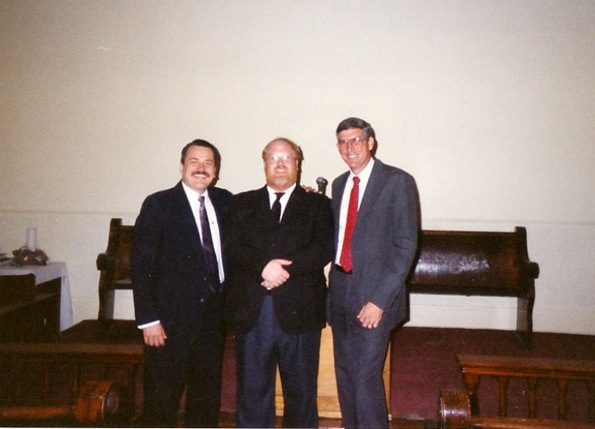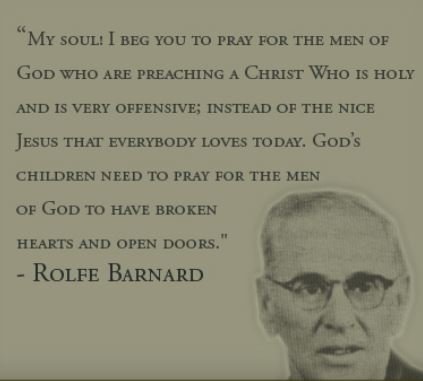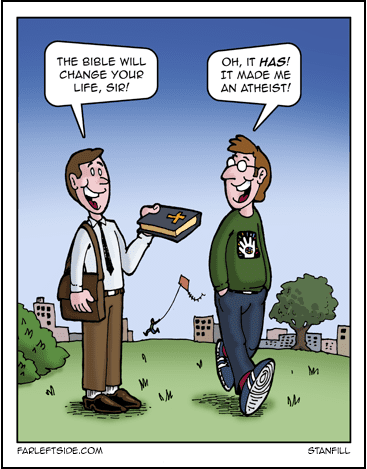
Just when I thought the Bible God couldn’t be crueler, an Independent Fundamentalist Baptist (IFB) preacher names James Bachman found a way to make God a bigger dick than I ever thought possible. Bachman, pastor emeritus of Roanoke Baptist Church, in Roanoke, Indiana, is the author of the ‘Parson to Person’ column that appears weekly in the West Bend News. Several ago, Bachman answered the following question:
Are those who are in hell receiving less punishment than they will after the judgment?
Bachman replied,
Yes, their present punishment in hell is equal for rejecting Christ and not believing on Him. – “He that hath the Son hath life; and he that hath not the Son of God hath not life.” 1 John 5:12. Hell is a terrible place of continual torment in flames. – “And in hell he lifts up his eyes, being in torments, and seeth Abraham afar off, and Lazarus in his bosom. And he cried and said, Father Abraham, have mercy on me, and send Lazarus, that he may dip the tip of his finger in water, and cool my tongue; for I am tormented in this flame.” (Luke16:23-24)
At the end of this world all unbelievers will be delivered up from death and hell to be judged justly for additional punishment according to their own sins. – “And I saw the dead, small and great, stand before God; and the books were opened: and another book was opened, which is the book of life: and the dead were judged out of those things which were written in the books, according to their works. And the sea gave up the dead which were in it; and death and hell delivered up the dead which were in them: and they were judged every man according to their works. And death and hell were cast into the lake of fire. This is the second death.”(Revelation 20: 12-14)
An earthly illustration would be a bad criminal being put in a county jail until after his trial and sentencing. Then he is sent to prison where he
will spend the remainder of his sentence. For unbelievers who start out in hell, they will have to spend the rest of eternity after their judgment in the lake of fire, still experiencing hell but also at the same time, additional suffering for each of their sins.
Most IFB preachers believe that Hell is a temporary holding place in the bowels of the earth for non-Christians after they die. Then, at the end of time, the inhabitants of Hell will cast into the Lake of Fire. Revelation 20:14-15 says:
And death and hell were cast into the lake of fire. This is the second death. And whosoever was not found written in the book of life was cast into the lake of fire.
The Lake of Fire, then, is the eventual permanent residence for all non-Christians. Billions of people will reside in the Lake of Fire, subject to excruciating torture day and night for eternity. Why? Because they were born to the wrong parents, lived in the wrong country, worshipped the wrong god, or believed the wrong things. Sure, Hitler, Stalin, Pol Pot, and Donald Trump will be there, but most of the inhabitants of the Lake of Fire will be just ordinary, good people who, on balance, tried to live good lives, or people such as Jews in WWII who were systematically slaughtered by the Nazis, or people who were blown to bits by mankind’s war machine, or children who died ignominiously of curable diseases, thirst, or starvation.
Many of the residents of the Lake of Fire will end up there without ever hearing the name of Jesus or the Christian gospel one time. Evangelicals such as Bachman explain how this is just by saying that no sinner deserves salvation; and that all sinners deserve Hell and the Lake of Fire. Consider yourself lucky if you are one of the elect, the chosen ones. Such lines of argument fall flat, failing to adequately explain how a just God could banish people, through no fault of their own, to the Lake of Fire for not hearing the gospel. Really, God?
Evangelicals also argue that according to Romans 1 and 2, all humans have moral consciences given to them by God, rendering them without excuse. Further, all any of us need to do is look at the created universe and connect the dots. Somebody bigger than you or I created the universe! In 1960, gospel artist Mahalia Jackson sang:
Who made the mountains, who made the trees
Who made the rivers flow to the sea
Who hung the moon in the starry sky
Somebody bigger than you and IWho made the flowers to bloom in the spring
Who writes the song for the robins to sing
Who sends the rain when the earth is dry
Somebody bigger than you and I(He lights the way) He lights the way
(When the road is long) When the road is long
(And He keeps you company) He keeps you company
(With His love) With His love to guide you
(He walks beside you)He walks beside you
(Just like he walks with me) Just like He walks with meWhen I am weary, filled with despair
Who gives me courage to go on from there
And who gives me faith that will never never die
Somebody bigger than you and I
(Somebody bigger than you and I)
I am more than willing to admit that someone can look at the night sky and conclude that a creator of some sort created everything — a deistic God, perhaps. However, how one gets from A GOD to that God being THE GOD of Trinitarian, Protestant Christianity is a whole different discussion. Evangelicals answer this objection by saying that if an unbeliever — say an aborigine in Australia — looks at the night sky and says to himself, “a God of some sort created this,” the Christian God will either take that into account on judgment day (giving them lesser punishment in the Lake of Fire?) or will send an Evangelical missionary to their door to tell them who, exactly, created the universe.
Evangelicals go to great lengths to cover their asses on the question of what happens to people who have never heard the gospel. Press them long enough, and Evangelical apologists will eventually appeal to mystery, the alleged justice and fairness of God, or God’s thoughts and ways not being our thoughts and ways. Evangelical Apologetics 101 teaches that if your answer to a difficult question is lacking, just appeal to God’s unknowing ways or run to the safety of the house of faith.
Where Bachman’s God becomes especially cruel is when those who land in Hell are punished further in the Lake of Fire. In Luke 16, we find the story of the rich man and Lazarus. Luke 16 tells that the rich man died, went to Hell, and is tormented day and night. According to Bachman, the rich man went to Hell because he rejected Jesus Christ. Never mind the fact that the Bible says otherwise; that the rich man went to Hell because of how he lived in light of those suffering around him. He was indifferent to the plight of Lazarus, and now he is being punished in Hell for his indifference.
Bachman believes that the inhabitants of Hell, some of whom have been suffering for thousands of years, will be delivered from Hell, only to be re-judged for their sins and cast into the Lake of Fire to suffer worse torture than before. Imagine the rich man getting his release from Hell, a brief respite from pain and suffering, only to be told that he was headed for a more violent torture chamber, one that will remind him for all eternity of all the ways he slighted the Christian God and broke his rules. Bachman’s God wins the “Worst God Ever” award.
Years ago, I was listening to a cassette tape of a sermon by evangelist Rolfe Barnard, a Calvinistic Southern Baptist preacher. Back in the day, Barnard was, by far, my favorite preacher. Barnard described the Lake of Fire as a fiery, smoky pit located outside of the New Jerusalem — the home of God’s elect. On judgment day, says Barnard, the elect will stand nearby and watch as God judges their friends and loved ones and casts them into the Lake of Fire. On this day, there will be no tears. God’s chosen ones will praise his name and give glory to his holiness and justice every time he tosses a person in the Lake of Fire. Imagine the perverseness of this illustration. Imagine standing by and watching as God throws your children and spouse into the Lake of Fire, knowing that they will be horrendously tormented for eternity. “Praise Jesus! My son is facing the just desserts for his sin and rejection of Evangelical Christianity!! Woo Hoo! Jesus, you are awesome!” Talk about sick, disgusting theology.
Evangelicals make all sorts of theological arguments. I am weary of them all. I just want to know what they believe about judgment, Hell, and the Lake of Fire. Forget all the ‘splaining and Bible proof-texting. Just tell me whether or not all non-Evangelicals will be tortured by God for eternity in the Lake of Fire. How you answer this question tells me all I need to know about you as a person, your God, and your religion.
Bruce Gerencser, 68, lives in rural Northwest Ohio with his wife of 47 years. He and his wife have six grown children and sixteen grandchildren. Bruce pastored Evangelical churches for twenty-five years in Ohio, Texas, and Michigan. Bruce left the ministry in 2005, and in 2008 he left Christianity. Bruce is now a humanist and an atheist.
Your comments are welcome and appreciated. All first-time comments are moderated. Please read the commenting rules before commenting.
You can email Bruce via the Contact Form.






